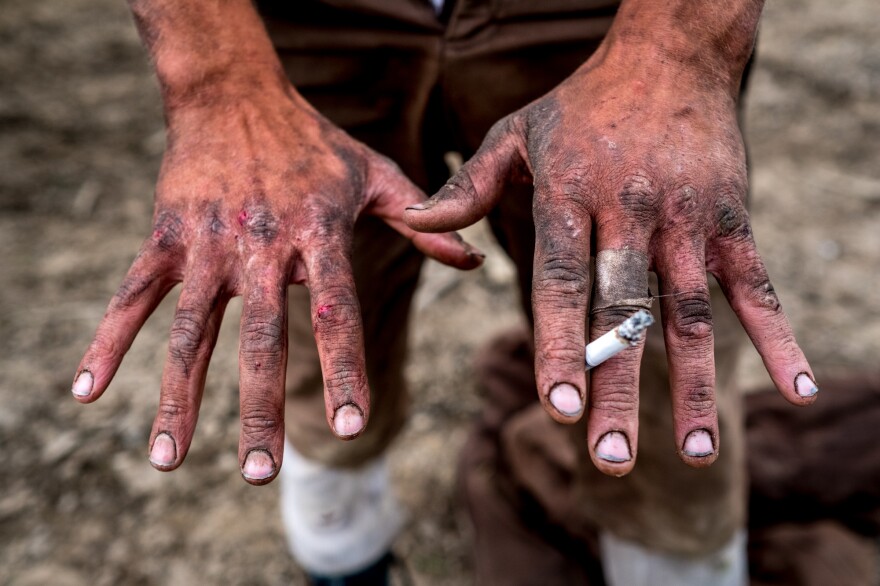It's Earth Day! To celebrate, NPR's Picture Show takes a look at one photographer's experience as a tree planter.
At 17 years old, Luc Forsyth decided that he wanted to study literature because he loved to read, but he quickly found out that the two weren't interchangeable. In his sophomore year, he was considering a serious change — he wanted to find something that would challenge him.
His roommate offered up a suggestion: "Why don't you go into tree planting?"
The question changed his life.

Forsyth now works as a cinematographer for documentaries but previously, he planted trees for five seasons in provinces across Canada. In total, he's spent more than two years of cumulative time living in a tent.
Now, having established a career in documentary filmmaking, he's returned to his former life to share just what tree-planting is with the rest of the world.

Forestry happens to be one of Canada's largest exports and there is a whole industry built around the Canadian law that requires trees to be planted.
"It is an environmental job in some senses, but it's also an industrial job," Forsyth says. "In Canada, it's the law that these trees have to be planted. The environmental aspect of it comes into play because you're essentially building a tree farm. Once you reach a critical mass of these new plants, then you don't have to cut down old-growth forests anymore. The logging companies would actually prefer to cut down one of these planted sites because the trees are spaced out in such a way that it's easy for them to go in and harvest these things."
"The idea is meeting the future demand for wood without cutting down old-growth forest. "

When he decided to go into tree planting, Forsyth was young and seeking an experience that would fuel his longing for adventure, but it wasn't exactly all that he thought it would be.
"I grew up camping and [thought] stuff like this, this would be no problem — I'm outdoorsy — and I showed up ... This is, by so much, the hardest thing I've ever done," he says. "I was not prepared for it at all, actually, to the point where, in my first season, I tried to break my own fingers so I could leave and not have to go through the public shame of quitting. But my body wouldn't allow it."
"But then I just, after five minutes, was like, 'Well, I guess I'll go back to planting these trees.' And then I did it for five years."

The job entails back-breaking manual labor. Tree planters are responsible for providing their own gear and paying for their own food. They're often in remote locations where there is little to no cell phone service. Depending on the company, they're out working anywhere between 8 and 12 hours each day.
So why do people do it?
"Well, you can make a lot of money," Forsyth says. "It's piecework, [so] you [are paid] by the tree. When I was doing it, I started at seven and a half cents a tree and when I went back [to visit] last year, I think some of them are getting more, like, 15 cents a tree."
"It depends on which part of the country you're in and it's calculated based on the difficulty of the land, how much driving is involved — that is kind of like an algorithm that they use to figure it out. My best day ever [was] 8,100 trees in a day, which is not normal, but I'd say you probably want to aim for at least 2,500, would be a low figure that I would have. If you're not working that hard, you make a lot less — but it's good money. Once you're a pretty experienced tree planter, you might only have to work three, four months of the year and then you can just travel, backpack and do whatever."

On top of that, there's a social aspect that plays a big part in helping tree-planters find community during what can be a very isolating job.
"I think tree-planting puts you into contact with all sorts of people that you may not ever meet any other way," Forsyth says. "It's all people who are drawn to this idea of an experience and adventure."


He's described this niche community as a village of outcasts and weirdos. They've come from all over to make a life for themselves and to find somewhere they can belong.
"You don't sign up because you're looking for an easy way to make a quick buck. If you decide to do it, you're usually looking for something more and you think the experience could be valuable to you," Forsyth says.
"You're in this little community. You might not even like everybody there, but you're all going through this really hard experience together. Because you're sharing those hardships, you can get through it."


Forsyth walked away from the work realizing that he could go through a lot more than he ever thought possible. He allowed himself to be vulnerable to testing his limits in conditions that were harsh. He learned who he was during that time of his life and says he carries that knowledge into everything he's gone on to do since.
"I hope it inspires people to try unconventional challenges and to try things that might look outside their comfort zone," Forsyth says. "It is the most powerful experience I've ever had and has made the most significant impact on my life and my future of anything I've ever done. I mean both financially — it enabled me to start traveling and being a documentary photographer — physically and emotionally, [it] prepared me for the challenges [I'll] face."
Copyright 2023 NPR. To see more, visit https://www.npr.org.




